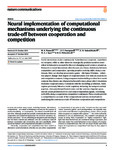Neural implementation of computational mechanisms underlying the continuous trade-off between cooperation and competition
| dc.contributor.author | Pisauro, MA | |
| dc.contributor.author | Fouragnan, Elsa | |
| dc.contributor.author | Arabadzhiyska, DH | |
| dc.contributor.author | Apps, MAJ | |
| dc.contributor.author | Philiastides, MG | |
| dc.date.accessioned | 2022-11-28T17:45:45Z | |
| dc.date.issued | 2022-11-11 | |
| dc.identifier.issn | 2041-1723 | |
| dc.identifier.issn | 2041-1723 | |
| dc.identifier.other | 6873 | |
| dc.identifier.uri | http://hdl.handle.net/10026.1/20024 | |
| dc.description.abstract |
Social interactions evolve continuously. Sometimes we cooperate, sometimes we compete, while at other times we strategically position ourselves somewhere in between to account for the ever-changing social contexts around us. Research on social interactions often focuses on a binary dichotomy between competition and cooperation, ignoring people’s evolving shifts along a continuum. Here, we develop an economic game – the Space Dilemma – where two players change their degree of cooperativeness over time in cooperative and competitive contexts. Using computational modelling we show how social contexts bias choices and characterise how inferences about others’ intentions modulate cooperativeness. Consistent with the modelling predictions, brain regions previously linked to social cognition, including the temporo-parietal junction, dorso-medial prefrontal cortex and the anterior cingulate gyrus, encode social prediction errors and context-dependent signals, correlating with shifts along a cooperation-competition continuum. These results provide a comprehensive account of the computational and neural mechanisms underlying the continuous trade-off between cooperation and competition. | |
| dc.format.extent | 6873- | |
| dc.format.medium | Electronic | |
| dc.language | en | |
| dc.language.iso | eng | |
| dc.publisher | Springer Science and Business Media LLC | |
| dc.subject | Humans | |
| dc.subject | Brain Mapping | |
| dc.subject | Cooperative Behavior | |
| dc.subject | Brain | |
| dc.subject | Gyrus Cinguli | |
| dc.subject | Social Environment | |
| dc.subject | Magnetic Resonance Imaging | |
| dc.title | Neural implementation of computational mechanisms underlying the continuous trade-off between cooperation and competition | |
| dc.type | journal-article | |
| dc.type | Journal Article | |
| dc.type | Research Support, Non-U.S. Gov't | |
| plymouth.author-url | https://www.webofscience.com/api/gateway?GWVersion=2&SrcApp=PARTNER_APP&SrcAuth=LinksAMR&KeyUT=WOS:000882306500025&DestLinkType=FullRecord&DestApp=ALL_WOS&UsrCustomerID=11bb513d99f797142bcfeffcc58ea008 | |
| plymouth.issue | 1 | |
| plymouth.volume | 13 | |
| plymouth.publication-status | Published online | |
| plymouth.journal | Nature Communications | |
| dc.identifier.doi | 10.1038/s41467-022-34509-w | |
| plymouth.organisational-group | /Plymouth | |
| plymouth.organisational-group | /Plymouth/Faculty of Health | |
| plymouth.organisational-group | /Plymouth/Faculty of Health/School of Psychology | |
| plymouth.organisational-group | /Plymouth/REF 2021 Researchers by UoA | |
| plymouth.organisational-group | /Plymouth/REF 2021 Researchers by UoA/UoA04 Psychology, Psychiatry and Neuroscience | |
| plymouth.organisational-group | /Plymouth/Users by role | |
| plymouth.organisational-group | /Plymouth/Users by role/Academics | |
| plymouth.organisational-group | /Plymouth/Users by role/Researchers in ResearchFish submission | |
| dc.publisher.place | England | |
| dcterms.dateAccepted | 2022-10-27 | |
| dc.rights.embargodate | 2022-12-9 | |
| dc.identifier.eissn | 2041-1723 | |
| rioxxterms.funder | Medical Research Council | |
| rioxxterms.identifier.project | Mapping the neural basis of credit assignment for a new targeted intervention in addiction | |
| rioxxterms.versionofrecord | 10.1038/s41467-022-34509-w | |
| rioxxterms.licenseref.uri | http://www.rioxx.net/licenses/all-rights-reserved | |
| rioxxterms.licenseref.startdate | 2022-11-11 | |
| rioxxterms.type | Journal Article/Review | |
| plymouth.funder | Mapping the neural basis of credit assignment for a new targeted intervention in addiction::Medical Research Council |


